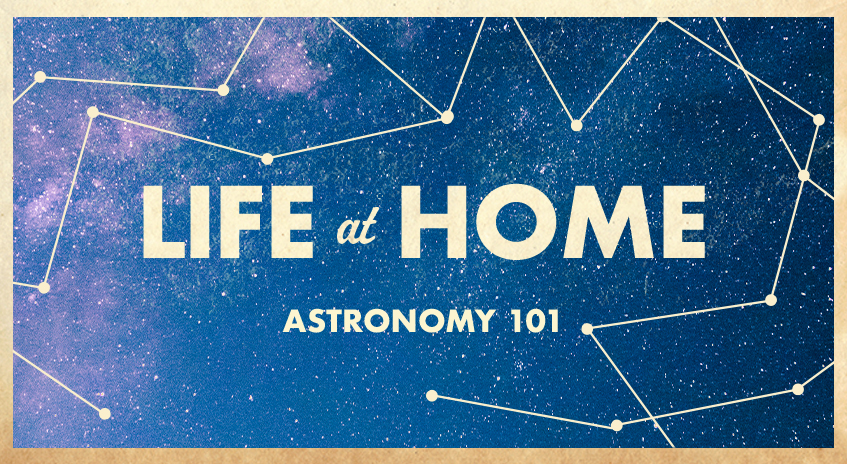When was the last time you looked at the night sky? Like really looked at what’s up above us in the universe? Space is really cool and we wanted to explore the dark skies more in Genesis Land communities with the help of the Royal Astronomical Society of Canada (RASC), Calgary chapter. We asked Simon Poole some questions to get us started in astronomy. We learned a lot and we hope you do too!
1. How did you get started in astronomy?
I had always loved science, especially physics and astronomy. I completed my Master’s degree in physics over ten years ago. It wasn’t until 2016 that I attended a live event with the Royal Astronomical Society of Canada at the local observatory that I truly got started in the hobby. I saw Jupiter and Saturn through a telescope and could see the colour variations of the planets and saw the rings of Saturn. Our family invested in a telescope, and we started to find many wonderous things in the night sky including nebulae, clusters, and galaxies.
2. What do you love most about astronomy?
I love that astronomy is a wide-reaching hobby that can be enjoyed by anyone around the world. The sky is open to everyone, all you need to do is look up. Whether you just use your own eyes or advanced equipment you can receive satisfaction by being out under a dark sky. Astronomy is also a gateway science. It can lead to a passion in geology, chemistry, physics, engineering, biology, mathematics and many more. It is a perfect hobby for a youth who is interested in STEM (Science, Technology, Engineering, and Mathematics). There is no steep learning curve at all. My 10-year-old has learned how to quickly find clusters and nebulae with a telescope from our own suburban backyard!
3. If someone is new to astronomy, what are 3 basic things they should know?
When you are new to astronomy it is great to know that you can start out with just your unaided eye. You can learn the constellations, see the movement of the planets and, under darker skies, see the heart of the Milky Way. It is always good to get away from the city, even if it is just a few tens of kilometers. Another good thing to know is that the sky is always changing from season to season. The Spring sky is much different than the Autumn Sky and it is always worth getting outside from time to time to witness the cycle of the constellations.
4. What tools/equipment does someone need to look at the stars?
The best equipment to start out with is your own eyes as you will be able to see the widest field of view. If you would like to enhance the visibility of dimmer objects a great step up would be a pair of binoculars. Many people have a pair lying around the house for one reason or another and they are great for astronomy. Put the Moon in your binoculars or scan the dark sky for star clusters, galaxies, and nebula. You can even see the four largest moons of Jupiter! When you feel like you want to upgrade it would be worth it to invest in a telescope. The Calgary RASC has a Telescope for Rent Program for members where you can try out quality telescopes for less than $20 a month. If you like what you see you can buy your own version and set it up anytime you like!
5. Where are the best places in Calgary/Airdrie to view the skies?
The best places around Calgary and Airdrie to view the night sky is away from the cities. If you can get out into the countryside (even just 10-15 minutes away from the city) you will be able to see many more stars and dimmer objects without the light pollution. The RASC has an observatory one can use 24/7 near De Winton and many of us go there and setup our own telescopes or those we have rented. However, if you’d like to stick closer to home, your own backyard or local park would be great to view the night sky.
6. What should we be looking for in the sky this fall?
This Fall look south, and you will see two bright planets. Jupiter is the brighter of the two and more easterly while Saturn is just west and dimmer. They are in a region of dim stars so they should be very easy to tell apart. Later in the evening look towards the rising stars at the eastern horizon and you may see some of your favourite constellations such as . If you look carefully, you may see the Orion Nebula below the three belt stars of Orion. If you have binoculars or a telescope you can see this gassy region of space in all its glory.
7. Where can people learn more about astronomy?
If you would like to learn more about astronomy, the Calgary Centre of the Royal Astronomical Society of Canada is your best bet. We have equipment, classes and members who can give you one-on-one training in the basics and more advanced observing. Members will have full access to an observatory 365 days and nights of the year and can freely camp at our dark-sky ranch near Caroline, Alberta. With the Telescope for Rent program, you can use more than twenty different pieces of equipment to bring the universe down to your own backyard. Join us for star parties, free public lectures, and receive a great supply of literature that will help you navigate the vastness of space. We have classes held at the observatory each month for youth and adults which will give you a hands-on experience with telescopes with some of the best astronomers in the country. If you’d like more information, do not hesitate to reach out!
If you want to learn more about astronomy or the Royal Astronomical Society of Canada, visit their website or send them an email!
We want to help you get started exploring the dark skies with our Life at Home N°10 Giveaway, a Backyard Astronomy Guide Book + NightWatch Book + Sky Watcher Heritage 150mm Collapsible Telescope + 1 year The Calgary Centre of the Royal Astronomical Society of Canada (RASC) Membership! Enter to win Simon’s recommended dark sky telescope so you can get started right in your own backyard. Click here to enter.
Photo credit: George Cavanaugh & Dalton Wilson











